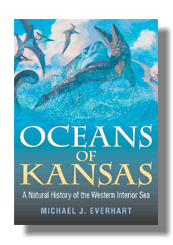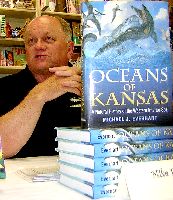|
ACKNOWLEDGMENTS
There are so many people who, over the years, have helped me
learn and understand the paleontology of
Kansas
during Late Cretaceous that it is difficult to know where to begin in
expressing my appreciation. You’ve all heard the adage that it takes
a village to raise a child. I can certainly testify that it also takes
one to write a book.
First, I thank my wife, Pamela Everhart for her support and
companionship (not to mention her superior ability to find interesting
things for me to dig up) in the field. She was also properly impressed
when I brought a mammoth tooth to class while we were in high school.
This book and a lot of other projects in paleontology would not have
been possible for me without her. The rest of the list follows in no
particular order. My fifth grade teacher, Vivian Louthan, encouraged
my interest in “rocks” and took me to a gem and mineral show that
left a lasting impression. John Ransom, Harry Rounds and Don Distler,
among many other teachers, guided my interest in the study of living
things, and the remains of things that lived millions of years ago.
Paul Tasch introduced me to the Smoky Hill Chalk on a vertebrate
paleontology field trip in 1968 and I immediately was hooked on it.
David Parris, Barbara Grandstaff and J. D. Stewart were all supportive
as well as being excellent teachers and resources of otherwise unknown
and mysterious information when we were getting started in our serious
study of the Smoky Hill Chalk in the late 1980s. Although he may not
remember it, David Parris sponsored my membership in the SVP many
years ago. I owe a major debt of thanks to J. D. Stewart and Donald
Hattin for our continuing discussion of the stratigraphy of the Smoky
Hill Chalk. Pete Bussen has been a source of valuable information on
history, paleontology, weather, and a variety of other useful subjects
which he gained in his pursuit of his “Doctor of Disagree-ology”
degree. I have found that Pete has a learned opinion on just about
everything, whether I asked for it or not. A number of landowners in
western
Kansas
, including the Albins, Birds, Babcocks, Bentleys, Bodeckers, Bonners,
Cheneys, Collins, Millers and Surratts have generously allowed us
access to their property over the years and obviously made many of our
discoveries possible. Richard Zakrzewski, Larry Martin and
Ken Carpenter
made the collections in their charge available for study, and provided
guidance and answers to even more questions. Their friendship has
always been appreciated. Richard Zakrzewski assisted in getting my
appointment as an Adjunct Curator of Paleontology at the
Sternberg
Museum
. Dale Russell, Gorden Bell, Jim Martin, Bruce Schumacher,
Kenshu Shimada
, David Schwimmer, Glenn Storrs and
David Cicimurri
indulged me in discussions of a variety of subjects, but mostly
mosasaurs, plesiosaurs and sharks.
Earl Manning
, in particular, has been a wonderful resource of useful information
on identification of specimens, reference material, historical issues
in paleontology, and general all around common sense. At one time or
another, Bob Purdy, Michael Brett-Surman,
Earle Spamer
,
Ted Daeschler
,
Charles Schaff
, Desui Maio, Michael Morales, George Corner, Greg Liggett and many
others have helped me track down fossils that originated in Kansas.
Dan Varner, Doug Henderson, Russell Hawley and other artists have
provided me with their enlightened reconstructions of a lost world I
can only dream about. Steve Johnson’s questions regarding a few
mosasaur vertebrae led us both to a once in a lifetime discovery. The
time spent in the field with Tom Caggiano, Steve Balliett and Andy
Abdul has been as educational for me as I hope it has been for them. I
will always “owe” Tom Caggiano for his discovery of the missing
dinosaur foot. Shawn Hamm and Keith Ewell dragged me “kicking and
screaming” into the study of fossil sharks from other formations in
Kansas
. A number of anonymous reviewers and some who aren’t anonymous have
made me aware (tactfully, of course) of my short-comings as a writer
and paleontologist – their assistance has been invaluable to me and
I hope they see that I learned something in the process. Access to the
Internet has allowed me to meet and converse with co-workers in
distant places that I will probably never meet in person.
Nevertheless, I count them as good friends and thank them for their
help over the years. A
variety of library people from all over the world, including Angie
from Kansas, and Steve from New Zealand, have helped me to accumulate
necessary paleontology reference materials, some of which are
extremely rare or difficult to find.
And in closing, I certainly appreciate all of those people from
around the world who have communicated with me in English because I
know I would have never been able to return the favor in their
language. While this
turned out to be a long list. I’m sure I’ve unintentionally left
out several people, so please forgive the oversight. As I said
earlier, it takes a village… |

